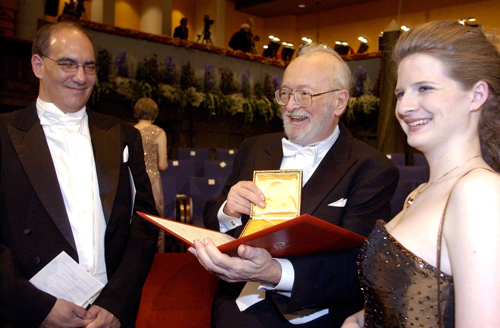
URBANA, Ill. Magnetic Resonance Imaging (MRI) pioneers and researchers from across the country will gather March 26-28 at the Beckman Institute on the University of Illinois campus to honor the late Nobel Laureate Paul C. Lauterbur.
The Paul C. Lauterbur Memorial Symposium will provide a unique forum for a systematic discussion of historical developments, present status, and future directions in a field that Lauterbur initiated.
The symposium will feature four plenary sessions of invited talks and two keynote lectures by leading MRI researchers, as well as two special sessions of talks by some of Lauterbur's former collaborators and students, and a social program honoring his life and achievements.
Prof. Lauterbur and Sir Peter Mansfield won the Nobel Prize for Physiology or Medicine in 2003 for their "seminal discoveries concerning the use of magnetic resonance to visualize different structures. These discoveries have led to the development of modern magnetic resonance imaging, MRI, which represents a breakthrough in medical diagnostics and research."
Lauterbur founded what is now called the Beckman Institute Biomedical Imaging Center (BIC) on campus. BIC Director Art Kramer and fellow Beckman researcher Brad Sutton are on the organizing committee while Beckman Institute Associate Director Van Anderson is a co-chair of the event.
"Paul Lauterbur was a Beckman Institute faculty member for over twelve years so it is incredibly exciting to host the Paul C. Lauterbur Memorial Symposium at the Beckman Institute to honor Paul's life and achievements," Anderson said. "The program features top researchers who will provide a glimpse of the history of magnetic resonance imaging and spectroscopy, as well as the state-of-the-art research and the emerging technologies in the field."
Zhi-Pei Liang, a faculty member at Beckman and in the Department of Electrical and Computer Engineering at Illinois, is also a co-chair. Liang was a post-doctoral student under Lauterbur before becoming his colleague on the faculty at Illinois.
"I'm very pleased to have the opportunity to help put this symposium together," Liang said. "I worked with Paul for 17 years. He was not only a great scientist but also a very humble, gracious, and caring person."
Liang said that Lauterbur, who died in March of 2007, inspired many fellow scientists and students over the years.
"Paul's life and career have been a great source of inspiration for so many people, so having the symposium here will not only pay tribute to him but also educate a new generation of students and junior researchers," Liang said. "Paul is one of the greatest scientists of the 20th Century. Being a faculty member here, he brought tremendous visibility to the campus."